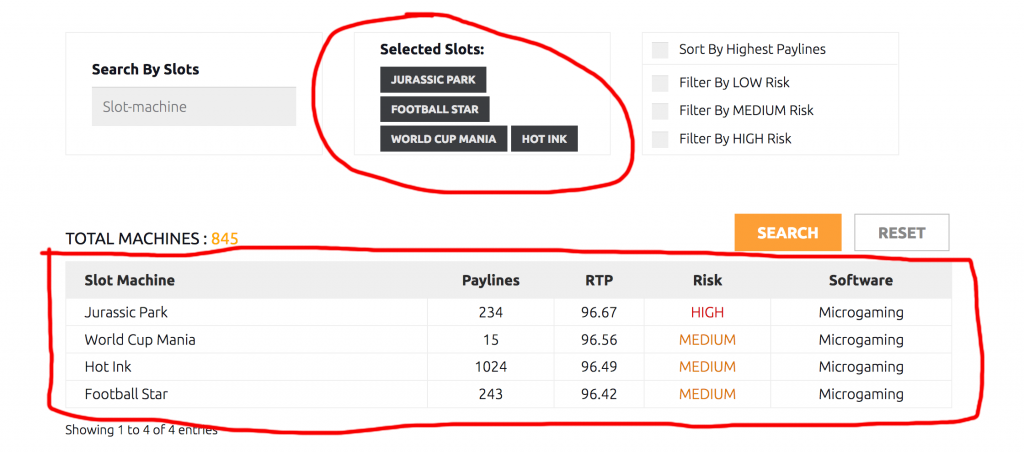Casino Slot Ev Calculator
Lay Calculator (Basic) Lay Calculator (Advanced) Accumulator Calculator; Dutch 2-way; Dutch 3-way; Lucky 15 Calculator; Lucky 31 Calculator; Single Bet Calculator; Trixie Bet Calculator; EV Calculator; All Calculators; Tools. Odds Converter; Slot RTP Finder; Each Way Catcher; Academy. Tutorial: Each Way Catcher; Free Bets; Blog. EV Calculator Launched! Team Casino is delighted to launch an EV calculator! Understanding and calculating EV is a crucial part of casino offers, and we’re keen to make it easier than ever! Whenever we post an offer, we’ll always give the Expected Value, but we know that you’ll often receive offers.

The Quick Crunch casino bonus calculator runs thousands of simulations on any casino bonus to calculate the expected value of any casino bonus. Enter the figures and we’ll tell you the true value of the offer as well as the percentage chance of busting out. You can enter different bonus types, house edge and variance of games to work out how to play each offer for maximum value.
Bonus Types
Cashable Bonus - A cashable bonus means that once you have completed the wagering you can withdraw the bonus as cash. Typically once you have fulfilled the wagering requirements the bonus will be combined with your existing balance and you will be able to withdraw all funds.
Sticky Bonus - A sticky bonus is non withdrawable and can be used for wagering purposes only. For example if you get a 100% sticky bonus and you deposit £10, you will have £20 to play with. Once you have finished wagering, you will be able to withdraw your balance minus the £10 sticky bonus.
Refund Bonus - A refund bonus is fairly self explanatory. You deposit using your own funds and if you lose you will receive a refund up to a certain amount. An example may be, deposit £10, get a £10 refund if you lose.
Post Wager Bonus - A post wager bonus is applied to your account after you have completed a certain amount of wagering. For example Deposit £10 and get a £10 bonus after you have wagered £100.

Free Spins - Free spins bonuses are exactly what they say they are. You receive a number of free spins. For the purposes of the Quick Crunch these are free spins that are awarded without requiring a deposit and wagering of an initial balance.
Attributes
Deposit Amount - Enter the amount that you are looking to deposit in this box.
Bonus Amount - Enter your bonus amount in this box. Remember that your bonus will probably vary depending on how much you deposit.
Wagering - Enter the amount of wagering that you must complete to finish the offer. For example if you receive a bonus that must be wagered X10, that would require £100 of wagering before you can withdraw.
Target - With sticky bonus and refund bonuses, enter a target value that you hope to get to whilst playing the offer. The higher the number the greater the chance of busting out.
Max Cashback - Enter the maximum available from cashback on a refund offer in this box.
Free Spins - For Free Spins offers, enter the number of free spins that you will receive in this box.
Max Winnings - Some bonuses only allow you to withdraw a certain amount when completing the offer. If there is a maximum winning amount allowed, enter the value here.
Wager Winnings - With refund bonuses, sometimes the bonus must be wagered before you can withdraw. If the refund bonus needs to be wagered, entered the value of wagering that needs to be completed before you can withdraw it.
Bet Size - To work out the expected value and bust out percentage, you can alter the bet size. Usually the higher the bet size, the higher the bust out rate but the higher the EV (expected value) of the offer.
House Edge - Enter the house edge of the game you are looking to play here. Remember that this is the opposite value to the RTP (return to player), so if a game has an RTP of 95%, the house edge will be 5%. All games need to show the house edge, although it can be tricky to find sometimes.
Variance - The variance relates to the frequency of payouts and their value. Low variance slots pay out smaller winnings more frequently, whilst high variance slots pay out larger wins less frequently.
Type - Enter the game type that you are looking to play here. You can choose from slots, blackjack and roulette.
The purpose of this page is to explain the relationship between expected value (EV) and casino deposit bonuses. There are plenty of gambling blogs out there that list the latest bonuses, but I’ve noticed a dearth in websites that actually explain the EV of bonuses.
It’s good to know the EV of gambling bonuses because the EV tells you if the bonus is a good deal or not. If you go around getting deposit bonuses without considering the EV, you’re leaving money on the table.
After reading this article, you’ll know exactly what I’m talking about when I list the EV next to any bonus description on the blog.
A Basic Explanation of Expected Value
Expected value is a concept in probability that describes the average outcome of a random event. In gambling games, expected value is calculated to determine the long-term profitability of any wager or scenario.
A positive expected value (+EV) means that the gambling proposition is profitable over the long term. To calculate the expected value of any gambling game, you need just two key pieces of information:
- The odds of each outcome occurring
- The payouts of each outcome
With that information, you can tell if any gambling game, wager or bonus is profitable or not. Even better, you can tell exactly how profitable that game is.
Coin Flip Example
Let’s use a simple coin-flip game as an example. Pretend I offer you a wager in which we flip a coin. I’ll pay you $1 if it lands on heads and you will pay me $1 if it lands on tails. You can probably already tell that this is an even-money game; you have neither an advantage nor disadvantage in this game.
But let’s dig into the math for a second anyways to illustrate how expected value is calculated and how to interpret the results.
There are two possible outcomes in this game and we know the odds of each outcome. We also know the payout of each outcome. Thus, we have all the information we need.
| Outcome | Probability | Payout |
|---|---|---|
| Heads | 1/2 | $1 |
| Tails | 1/2 | -$1 |
What we do next is multiply each probability by each payout and then add it all up:
(1/2)*1 = .5
+
(1/2)*-1 = -.5
Total: 0
The expected value in this game is $0. That means over the long run, you can expect to break even in this game. Note that you will never win $0 in any single coin flip. You will always either win $1 or lose $1. Similarly, you will probably not come out exactly break even after 10 flips of the coin. In the short term, variance produces all kinds of crazy results.
But as we stretch this game out across many, many trials, your real results will reach closer and closer to exactly $0.
Don’t be turned off by how long this simple example looks in written form. I tend to be long-winded. The concept itself doesn’t require any advance mathematics.
Applying Expected Value to Casino Games
Here’s where things get interesting for gamblers. You can figure out the expected value of any casino game with a simple calculation. There are only two things that you need to know:
- The total amount of wagers that you plan to place
- The house advantage of the game

You can calculate the EV of any casino game by multiplying the amount of money that you plan to wager by the house advantage. For example, let’s say that you play a slot machine that has an exact house advantage of 5%. Let’s also say that you plan to spin the reels 1000 times for $1 per spin.
The total amount of wagers that you’re planning on wagering is $1,000. Multiply that by 5%:
$1,000 x 0.05 = $50
The expected value of this game is $50 in losses. Over the long run, you will lose $50 for every $1,000 that you wager in this particular slot machine.
I think it’s awesome how simple this calculation is. The house advantage for every casino game is published all over the internet. All you have to do is search for the house advantage of any game and multiply that number by the total sum of wagers.
In some games, the house advantage is affected by how you play. For example, the house advantage in blackjack changes drastically based on your strategy for that game. If you play a good blackjack game, you can get the house advantage down to 0.5% (and sometimes even lower). If you play blackjack poorly, the house advantage explodes upwards.
What this Means for Bonuses
Casino Slot Ev Calculator Estimate
What this all means is that you can figure out the expected value for any casino bonus if you have the following information:
- The wagering requirements
- House advantage of the game you will play
- Size of the bonus
Whenever you have a casino bonus that you want to get, look for the wagering requirements. Figure out exactly how much money you will need to wager to clear the bonus. Then, look up the house advantage for whichever game you will be using to clear the bonus.
All you have to do next is multiply the house advantage of that game by the total wagering requirements. For example, you plan on playing a 2.7% house advantage game and you need to wager a total of $60,000 on that game:
$60,000 x .027 = $1620
This means you can expect to lose $1620 over the course of clearing the bonus. You actual results may vary (by a lot), but this is the expected cost over the long term.
Now, compare that number to the amount of bonus money you stand to win. If this is a $2,000 bonus, you subtract $1620 in losses from the $2000 in bonus money for a grand total of $380.
The expected value of this bonus is $380.

Casino Slot Ev Calculator Formula
In this example, the bonus is a good deal. Hooray! Not all bonuses are so generous, though. And that is why it is good to understand the relationship between bonuses and expected value.
Casino Slot Ev Calculator Monthly
Please see this blog post for a more detailed explanation for calculating the EV of bonuses.